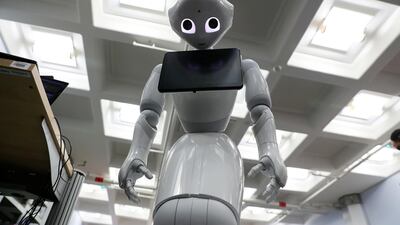Education must change to prepare children for a machine dominated future that will make large swathes of jobs redundant, experts have said.
A grim dystopian future was described by education specialists, at the International Government Communications Forum in Sharjah on Thursday, who called on governments and schools to take action now to prepare the next generation for new employment opportunities.
Creative skills should be the focus of new education, with children encouraged to sharpen their individual character traits, according to Marc Prensky, founder of non-profit think tank Global-Education for Future.
“Young people are unique individuals and our biggest challenge in education is to help them understand their potential to learn alongside the growing technological world,” he said.
“If children understand that, there will always be something for them to do.
“We must prepare them for a very different future.”
Although enrolment in higher education has increased in the Mena region over the last decade, the World Bank has questioned how many of those qualifications will be future proof.
It said higher education systems in Mena face challenges like expanding capacity, maintaining quality and relevance.
Youth unemployment rates in Mena are the highest in the world, at 21 per cent in the Middle East and 25 per cent in North Africa.
Manual labour jobs could be most at risk from the rise of machines in the near future.
As driving jobs are replaced by automated transport, for example, hundreds of thousands of unskilled workers are likely to be made redundant.
Experts speaking at the Sharjah forum also predict a decline in skilled, white collar jobs.
“Education in the Arab world, Europe and America is very similar in that it is designed for an industrial age that no longer exists,” said Graham Brown-Martin, education expert and founder of global movement - Learning without Frontiers.
“We are now training children to compete with machines, and in reality they will be much faster and more competent in many of these areas.
“Machines are much faster at finding and processing information than we are.”
Artificial Intelligence experts predict up to 40 per cent of existing jobs could be lost to machines within 15 years.
One bright note was the prospects for scientists and entrepreneurs, as future careers will be the jobs that machines cannot do.
“If it is a job that can be measured, or is based around a fixed set of rules, it will be done by a machine, such as a lawyer or an accountant,’ said Mr Brown-Martin.
“Our educational systems should now be focusing on nurturing the human potential, rather than trying to create machines.
“Teaching has been about instruction, and regurgitating information to pass an exam.
“This needs to change to prepare us for the future, as machines will always be better at this than humans.”


